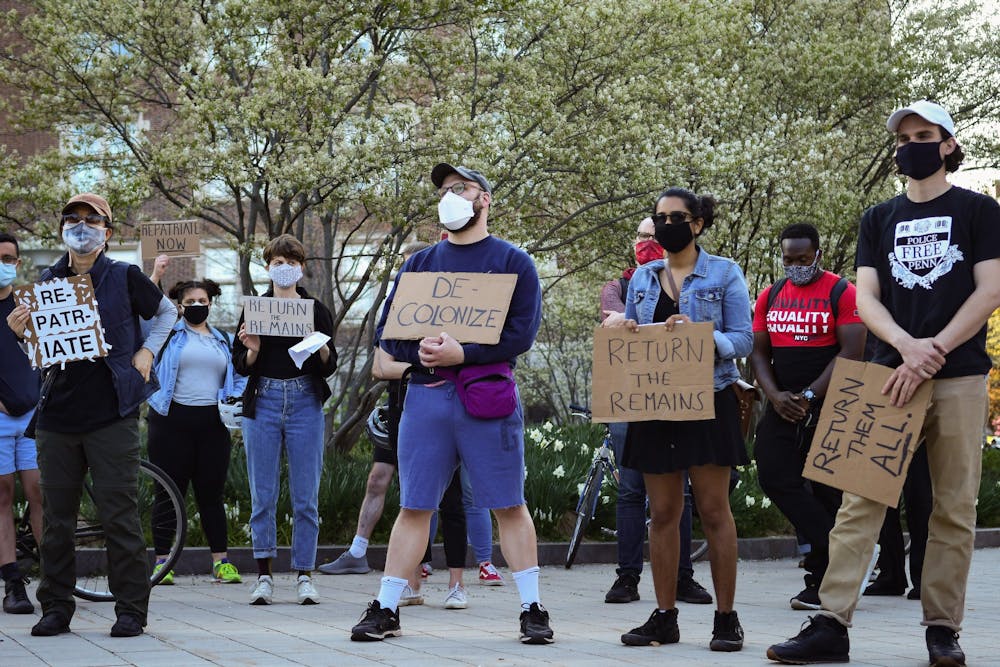More than 50 students and West Philadelphians marched outside the Penn Museum in a protest outside the Penn Museum on April 8 to urge the Museum to abolish its Morton Cranial Collection, a collection of about 1,000 crania with some belonging to enslaved individuals.
The protest was organized by Police Free Penn and Black Lives Matter Philly after a February 2021 report, authored by School of Arts and Sciences Ph.D. sixth-year Paul Wolff Mitchell, found that the Morton cranial collection holds the skulls of 14 Black Philadelphians which were robbed from their graves in the 19th century. The activist groups hope the protest will push the Museum to return and repatriate all remains within the collection so that it no longer exists, as well as stop circulating data collected from the skulls and any images currently online, organizer Abdul-Aliy Muhammad said.
In July 2020, the Museum removed the collection from public view after students called for the crania to be repatriated. The portion of the collection in public view was in a Center for the Analysis of Archaeological Materials classroom in the Museum before being put it in storage while the museum formed a committee to discuss repatriation and reburial of the remains.

One of the protesters' demands to the Museum was to return the remains to descendent Black spiritual communities.
Protestors had several demands to the Museum, including returning these remains to descendent Black communities, requesting a public commitment from the Museum to abolish the collection, initiating a transparent process of repatriation immediately with dedicated staff and resources, and initiating a public apology to Black Philadelphians for the harm inflicted by the collection’s use as a justification for white supremacist ideals.
Mitchell explained that because the remains cannot be specifically linked to living descendants, he believes they must be returned to Black Philadelphians, because the skulls were taken specifically because of their Black identity.
“The museum needs to acknowledge that these bodies were stolen and never should have been used,” Mitchell said in reference to the remains of Black Philadelphians. “Return them all.”
The protest began outside of the classroom that used to house the Morton collection and made its way to Penn President Amy Gutmann's home on 3812 Walnut Street, with people calling for the remains to be returned to their community.
RELATED:
Penn event explores structural causes of racism in policing
Black Penn students allege pattern of racism in Chemistry dept. on viral Instagram page
“Black lives matter to me, and I know they matter to all of us here, so I ask the Penn Museum: do they matter to you?” School of Arts and Sciences Ph.D. second year VanJessica Gladney said during the protest.
Gladney, who began working with the Penn & Slavery Project since its inception during her time as an undergraduate student at Penn, described how the movement to acknowledge the University's history with racism has grown exponentially over the past few years — to the point where she believes that calls for accountability now reach beyond Penn’s walls into the surrounding community.

West Philadelphian Abdul-Aliy Muhammad was one of the speakers.
Organizers, including Muhammad, stressed that the Black community of West Philadelphia needs to be an integral role in any actions taken by the Museum.
“Return the remains. Return them all and abolish the Morton Cranial Collection now,” Muhammad said at the protest. “They were exploited when they lived, and they’re still subjugated today.”
Muhammad, a lifelong West Philadelphian, first learned of the Morton collection at a 2019 Penn & Slavery Project symposium. Soon afterwards, Muhammad published an op-ed in The Philadelphia Inquirer calling for the skulls of enslaved individuals to be returned to descendent communities, and a second op-ed in April calling for the remains of Black individuals to be returned to local Black communities. Muhammad said that, beyond the demands of the protest, they wanted to educate other Philadelphians about the collection’s history.
“I’m angry that we have to be here. [Repatriation] should not be a question,” Muhammad said. “The Museum can’t respect them. They have not respected them.”
Several Black faith leaders spoke at the protest, including local pastor Nicolas O’Rourke who said that since the remains cannot be returned to their original burial grounds — which he said are now located underneath Penn Park — they must be given to spiritual communities who can perform proper rites.
“This is our ethical responsibility to our dead. There is still business that we must attend to,” O’Rourke said. “We’re not going to sit by and know that our Black bodies are on display. We will speak their truth and we will honor their bodies.”
West Philadelphian Charlyn Griffith-Oro, who spoke at the protest, also criticized the Museum’s inaction in returning the remains.
“How can [the Museum] think that our people are worth more to [them] than they are to us?” Griffith-Oro said.









